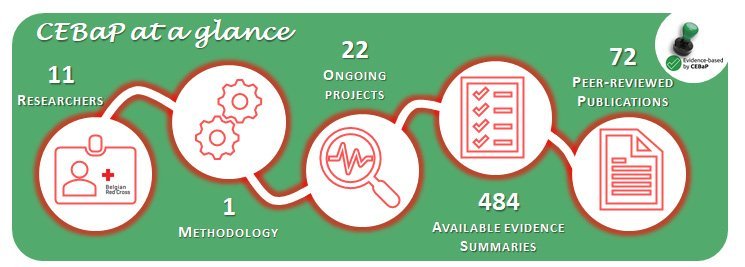Evidence-Based Practice at the Belgian Red Cross: bridging the gap between science and policy
19/10/20

On World Evidence-Based Healthcare Day we want to highlight how the Belgian Red Cross implements the methodology of Evidence-Based Practice through its Centre for Evidence-Based Practice and many other initiatives.
The Belgian Red Cross (BRC) is an aid organisation with a wide range of activities, from blood collection over first aid education to international development aid. BRC is a fine example of how the philosophy of Evidence-Based Practice (EBP) can be implemented in all layers of a multi-faceted organisation. Several initiatives have been taken to improve the uptake of EBP within the organisation.
The uptake of EBP has been incorporated in the long-term strategic vision of the BRC. A top-down managerial focus on EBP has increased the awareness of all employees and volunteers, and in 2009 the Centre for Evidence-Based Practice (CEBaP) was founded. At present, CEBaP consists of 11 trained researchers who provide scientific support to BRC’s activities. CEBaP receives requests from BRC’s operational departments – based on needs identified in the field – to develop systematic reviews or evidence-based guidelines, such as the first aid guidelines for Flanders, and for our partnering countries in Sub-Saharan Africa. These evidence-based products are then translated to practical materials, e.g. first aid training courses, to train volunteers or support field activities. CEBaP uses a fixed methodology to develop its evidence-based products, described in a methodological charter, and recently ISO certified. Whenever possible, the acquired knowledge is disseminated by publishing in peer-reviewed journals, presenting at international conferences or sharing on social media.
To improve the collaboration with CEBaP and the “EBP way of thinking” in the organisation, employees of the operational departments have the opportunity to receive education on the principles of EBP through a blended learning approach, consisting of a newly developed E-learning module (5 sessions, 1.5 h to complete) and a 1.5 h face-to-face moment with CEBaP. In addition, monthly journal clubs are organised for employees of both the blood collecting service and humanitarian services, to gain familiarity with primary research. Employees are stimulated to present and discuss a paper relevant to their field, with guidance from CEBaP.
In conclusion, multiple managerial and educational approaches are used to successfully implement EBP in the BRC. With EBP, BRC wants to step away from the common practice of the aid sector to rely on tradition, intuition or goodwill, and wants to provide aid with impact. With this approach, BRC is unique among the humanitarian aid organisations, and CEBaP is very proud to be part of this!
Want to know more about CEBaP? www.cebap.org
Interested in CEBaP’s E-learning? www.cebap.org/methodology/ebp-e-learning/
